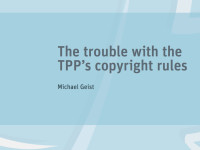International Trade Minister Chrystia Freeland has faced a challenging week given the possible collapse of the trade agreement between Canada and the European Union. Freeland and the Liberal government have worked hard to get CETA to the finish line with some changes to the investor – state dispute settlement rules (the rules should be dropped altogether) and frequent travel across Europe to garner support for the deal.
Back at home, the reaction to the CETA problems from the Conservative opposition has been embarrassing. Trade critic Gerry Ritz criticized Freeland, speaking of the need for adult supervision and calling on the government to get the job done. Freeland rightly called him out on the comments, but she could have also noted that the record suggests that it is the Conservatives that failed to get the job done on CETA. In April 2010, the Conservative government said it would be finished in 2011. In 2011, reports said it would be done in 2012. In October 2012, the projection was a deal by year-end. It took until the fall of 2013 for a ceremony marking an “agreement-in-principle”. That too proved to be premature as there was another event celebrating an official draft in 2014 followed by more legal drafting and the renegotiation of controversial ISDS provisions that led to the release of another text earlier this year. In other words, Freeland inherited far less than advertised on CETA and the Conservatives might not want to remind the public that their biggest trade accomplishment never actually involved a signed, final text.
The Ritz remarks have attracted attention, but comments yesterday from Prime Minister Justin Trudeau may have a longer and more damaging impact on Freeland.












